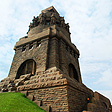GRASSI MUSEUM OF MUSICAL INSTRUMENTS - LEIPZIG
Perfect Sound at Germany’s Largest Instrument Collection
 If Leipzig is the German City of Music, the trail ends at the Grassi Museum of Musical Instruments, where "The Search for the Perfect Sound“ offers visitors insights into the music history of the city, the progression of musical sound development and five centuries of instrument making at Germany’s largest collection of musical instruments. The exhibits present the most important eras of music history divided into thirteen eras, or chapters. In addition to the physical representation of instruments through the ages, a 3D sound system allows the musical tones to be experienced by listening in realistic living quality from past centuries to the present. Among the more than five thousand instruments you can find the world’s oldest preserved original grand piano from 1726, the Violo de Gamba created by Ernst Busch of Nuremburg from 1640, and the Serpent oboe from Heinrich Grenser of Saxony, and a recreated musical instrument repair shop from the 19th Century.
If Leipzig is the German City of Music, the trail ends at the Grassi Museum of Musical Instruments, where "The Search for the Perfect Sound“ offers visitors insights into the music history of the city, the progression of musical sound development and five centuries of instrument making at Germany’s largest collection of musical instruments. The exhibits present the most important eras of music history divided into thirteen eras, or chapters. In addition to the physical representation of instruments through the ages, a 3D sound system allows the musical tones to be experienced by listening in realistic living quality from past centuries to the present. Among the more than five thousand instruments you can find the world’s oldest preserved original grand piano from 1726, the Violo de Gamba created by Ernst Busch of Nuremburg from 1640, and the Serpent oboe from Heinrich Grenser of Saxony, and a recreated musical instrument repair shop from the 19th Century.
 The Grassi Museum is a complex of art-deco style buildings housing the Museum of Decorative Arts, the Ethnographic Museum and the Museum of Musical Instruments. The museum gets its name from hometown merchant Franz Dominic Grassi, who left most of his considerable fortune to the city of Leipzig on his death in 1880. The original Grassi Museum was at a different location and the current building of the museum complex with an expanse of green lawns was constructed in the 1920s during in Germany’s architectural revival.
The Grassi Museum is a complex of art-deco style buildings housing the Museum of Decorative Arts, the Ethnographic Museum and the Museum of Musical Instruments. The museum gets its name from hometown merchant Franz Dominic Grassi, who left most of his considerable fortune to the city of Leipzig on his death in 1880. The original Grassi Museum was at a different location and the current building of the museum complex with an expanse of green lawns was constructed in the 1920s during in Germany’s architectural revival.
 The foundation of the Leipzig collection lies during the 19th century, established through a Dutch resident of the city, Paul de Wit. A music lover and avid collector, in 1886, de Wit opened a museum at Thomaskirchhof 16, where the Bach Museum is found today (see Bach Museum Leipzig). Musical instruments were on display and occasionally played in impromtu performances for visitors. De Wit tried to offer his collection to the city in 1905, but instead sold the instruments to a paper manufacturer who opened the Wilhelm Heyer Museum of Music History (Musikhistorisches Museum) in 1913.
The foundation of the Leipzig collection lies during the 19th century, established through a Dutch resident of the city, Paul de Wit. A music lover and avid collector, in 1886, de Wit opened a museum at Thomaskirchhof 16, where the Bach Museum is found today (see Bach Museum Leipzig). Musical instruments were on display and occasionally played in impromtu performances for visitors. De Wit tried to offer his collection to the city in 1905, but instead sold the instruments to a paper manufacturer who opened the Wilhelm Heyer Museum of Music History (Musikhistorisches Museum) in 1913.
 The exhibition included precious musical instruments from a collection of Baron Alessandro Kraus and various instruments made by the piano manufacturer, Ibach of Barmen. Heyer died not long after opening his museum, but it remained open for several years until his successors sold the collection to the University of Leipzig in 1926. The City of Leipzig offered the north wing of the newly built Grassi Museum as the new home of the instrument collection and the Museum of Musical Instruments of the University of Leipzig held its grand opening on May 30, 1929.
The exhibition included precious musical instruments from a collection of Baron Alessandro Kraus and various instruments made by the piano manufacturer, Ibach of Barmen. Heyer died not long after opening his museum, but it remained open for several years until his successors sold the collection to the University of Leipzig in 1926. The City of Leipzig offered the north wing of the newly built Grassi Museum as the new home of the instrument collection and the Museum of Musical Instruments of the University of Leipzig held its grand opening on May 30, 1929.
 The collection suffered extensive damage in World War II. During an allied bombing of the city on December 3rd of 1943, the museum building was completely destroyed by an incendiary fire. The pianos of the Ibach collection as well as the archives and the library were devastated. During the 1950s, the museum was rebuilt and the collection expanded again over time, but it wasn‘t until 2005 that the museum was fully refurbished. Today, the collection presents an amazing overview of European musical instruments from the Renaissance to the present. The hands-on room offers a charming chance to experiment with different sounds and see how instruments work, especially for kids, but adults will enjoy playing, too.
The collection suffered extensive damage in World War II. During an allied bombing of the city on December 3rd of 1943, the museum building was completely destroyed by an incendiary fire. The pianos of the Ibach collection as well as the archives and the library were devastated. During the 1950s, the museum was rebuilt and the collection expanded again over time, but it wasn‘t until 2005 that the museum was fully refurbished. Today, the collection presents an amazing overview of European musical instruments from the Renaissance to the present. The hands-on room offers a charming chance to experiment with different sounds and see how instruments work, especially for kids, but adults will enjoy playing, too.
Visiting the Grassi Museum Of Musical Instruments
 The museum is open Tuesday through Sunday from 10 am to 6 pm. Admission prices are €6 from standard adult, with €3 reduction for seniors and students. Combination tickets for three museums and two of the museums are €15 and €12 respectively. An Audio Guide is available for €1. Musical concerts are held at the museum requiring a separate ticket, and prices vary. The museum is stop number 6 on the Leipzig Music Trail. The museum is a 15 minute walk from the central train station, or take tram lines 4,7 or 12 to Johannes Platz or tram 15 to Grassi Museum on Prager Strasse. © Bargain
Travel Europe
The museum is open Tuesday through Sunday from 10 am to 6 pm. Admission prices are €6 from standard adult, with €3 reduction for seniors and students. Combination tickets for three museums and two of the museums are €15 and €12 respectively. An Audio Guide is available for €1. Musical concerts are held at the museum requiring a separate ticket, and prices vary. The museum is stop number 6 on the Leipzig Music Trail. The museum is a 15 minute walk from the central train station, or take tram lines 4,7 or 12 to Johannes Platz or tram 15 to Grassi Museum on Prager Strasse. © Bargain
Travel Europe
Find best hotel and vacation deals in Leipzig on TripAdvisor
Web
Info
Uni Leipzig Music Museum
These articles are copyrighted and the sole property of Bargain Travel Europe and WLPV, LLC. and may not be copied or reprinted without permission.
See Also:
YOUNG RICHARD WAGNER - LEIPZIG
MENDELSSOHN HOUSE – LEIPZIG
AUERBACHS KELLER - GOETHE INSPIRATION
BRUSSELS MUSICAL INSTRUMENT MUSEUM
SIEGFRIED'S MECHANISCHES MUSIKKABINETT
TRADITIONAL COFFEE HOUSES OF LEIPZIG
BACH HOUSE MUSIC MUSEUM - EISENACH
HANDEL HOUSE MUSIC MUSEUM - HALLE

